- Home
- Paulo Coelho
The Devil and Miss Prym Page 9
The Devil and Miss Prym Read online
Page 9
“One way or another, we have to save this village,” said the landowner, who was possibly the only one who stood to profit from Viscos’ demise, since he was in a position to buy up everything, then sell it on to a large industrial company. But of course he certainly didn’t want to hand over, for a price below market value, lands that might contain buried treasure.
“What do you think, Father?” asked the hotel landlady.
“The only thing I know well is my religion, in which the sacrifice of one individual saved all humanity.”
Silence descended for a third time, but only for a moment.
“I need to start preparing for Saturday Mass,” he went on. “Why don’t we meet up later this evening?”
Everyone immediately agreed, setting a time late in the day, as if they were all immensely busy people with important matters to deal with.
Only the mayor managed to remain calm.
“What you’ve just been saying is very interesting, an excellent subject for a sermon. I think we should all attend Mass today.”
Chantal hesitated no longer. She headed straight for the Y-shaped rock, thinking of what she would do with the gold as soon as she got it. Go home, get the money she kept hidden there, put on some more sensible clothes, go down the road to the valley and hitch a lift. No more wagers: those people didn’t deserve the fortune within their grasp. No suitcase: she didn’t want them to know she was leaving Viscos for good—Viscos with its beautiful but pointless stories, its kind but cowardly inhabitants, the bar always crammed with people talking about the same things, the church she never attended. Naturally there was always the chance that she would find the police waiting for her at the bus station, the stranger accusing her of theft, etc., etc. But now she was prepared to run any risk.
The hatred she had felt only half an hour before had been transformed into a far more agreeable emotion: vengeance.
She was glad to have been the first to reveal to those people the evil hidden in the depths of their false, ingenuous souls. They were all dreaming of the chance to commit a murder—only dreaming, mind you, because they would never actually do anything. They would spend the rest of their lives asleep, endlessly telling themselves how noble they were, how incapable of committing an injustice, ready to defend the village’s dignity at whatever cost, yet aware that terror alone had prevented them from killing an innocent. They would congratulate themselves every morning on keeping their integrity, and blame themselves each night for that missed opportunity.
For the next three months, the only topic of conversation in the bar would be the honesty of the generous men and women of the village. Then the hunting season would arrive and the subject wouldn’t be touched upon—there was no need for visitors to know anything about it, they liked to think they were in a remote spot, where everyone was friends, where good always prevailed, where nature was bountiful, and that the local products lined up for sale on a single shelf in the hotel reception—which the hotel landlady called her “little shop”—were steeped in this disinterested love.
But the hunting season would come to an end, and then the villagers would be free to return to the topic. This time around, after many evenings spent dreaming about the riches they had let slip through their fingers, they would start inventing hypotheses to fit the situation: why did nobody have the courage, at dead of night, to kill useless old Berta in return for ten gold bars? Why did no hunting accident befall the shepherd Santiago, who drove his flock up the mountainside each morning? All kinds of hypotheses would be weighed up, first timidly and then angrily.
One year on and they would be consumed with mutual hatred—the village had been given its opportunity and had let it slip. They would ask after Miss Prym, who had vanished without trace, perhaps taking with her the gold she had watched the stranger hide. They would say terrible things about her, the ungrateful orphan, the poor girl whom they had all struggled to help after her grandmother’s death, who had got a job in the bar when she had proved incapable of getting herself a husband and leaving, who used to sleep with the hotel guests, usually men much older than herself, and who made eyes at all the tourists just to get a bigger tip.
They would spend the rest of their lives caught between self-pity and loathing; Chantal would be happy, that was her revenge. She would never forget the looks those people around the van gave her, imploring her silence regarding a murder they would never dare to commit, then rounding on her as if she was to blame for all the cowardice that was finally rising to the surface.
“A jacket. My leather trousers. I can wear two T-shirts and strap the gold bar around my waist. A jacket. My leather trousers. A jacket.”
There she was, in front of the Y-shaped rock. Beside her lay the stick she had used two days before to dig up the gold. For a moment she savored the gesture that would transform her from an honest woman into a thief.
No, that wasn’t right. The stranger had provoked her, and he also stood to gain from the deal. She wasn’t so much stealing as claiming her wages for her role as narrator in this tasteless comedy. She deserved not only the gold but much, much more for having endured the stares of the victimless murderers standing around the baker’s van, for having spent her entire life there, for those three sleepless nights, for the soul she had now lost—assuming she had ever had a soul to lose.
She dug down into the soft earth and saw the gold bar. When she saw it, she heard a noise.
Someone had followed her. Automatically, she began pushing the earth back into the hole, realizing as she did so the futility of the gesture. Then she turned, ready to explain that she was looking for the treasure, that she knew the stranger walked regularly along this path, and that she had happened to notice that the soil had recently been disturbed.
What she saw, however, robbed her of her voice—for it had no interest in treasure, in village crises, justice or injustice, only in blood.
The white mark on its left ear. The rogue wolf.
It was standing between her and the nearest tree; it would be impossible to get past the animal. Chantal stood rooted to the spot, hypnotized by the animal’s blue eyes. Her mind was working frantically, wondering what would be her next step—the branch would be far too flimsy to counter the beast’s attack. She could climb onto the Y-shaped rock, but that still wasn’t high enough. She could choose not to believe the legend and scare off the wolf as she would any other lone wolf, but that was too risky; it would be wisest to recognize that all legends contain a hidden truth.
“Punishment.”
Unfair punishment, just like everything else that had happened in her life; God seemed to have singled her out purely to demonstrate his hatred of the world.
Instinctively she let the branch fall to the ground and, in a movement that seemed to her interminably slow, brought her arms up to her throat: she couldn’t let him sink his teeth in there. She regretted not wearing her leather trousers; the next most vulnerable part was her legs and the vein there, which, once pierced, would see you bleed to death in ten minutes—at least that was what the hunters always said, to explain why they wore those high boots.
The wolf opened its mouth and snarled. The dangerous, pent-up growl of an animal who gives no warning, but attacks on the instant. She kept her eyes glued to his, even though her heart was pounding, for now his fangs were bared.
It was all a question of time; he would either attack or run off, but Chantal knew he was going to attack. She glanced down at the ground, looking for any loose stones she might slip on, but found none. She decided to launch herself at the animal; she would be bitten and would have to run towards the tree with the wolf’s teeth sunk into her. She would have to ignore the pain.
She thought about the gold. She would soon be back to look for it. She clung to every shred of hope, anything that might give her the strength to confront the prospect of her flesh being ripped by those sharp teeth, of one of her bones poking through, of possibly stumbling and falling and having her throat torn out.
She prepared to run.
Just then, as if in a movie, she saw a figure appear behind the wolf, although still a fair distance away.
The beast sensed another presence too, but did not look away, and she continued to fix him with her stare. It seemed to be only the force of that stare that was averting the attack, and she didn’t want to run any further risks; if someone else was there, her chances of survival were increased—even if, in the end, it cost her the gold bar.
The presence behind the wolf silently crouched down and moved to the left. Chantal knew there was another tree on that side, easy to climb. At that moment, a stone arced across the sky and landed near the wolf, which turned with phenomenal speed and hurtled off in the direction of this new threat.
“Run!” yelled the stranger.
She ran in the direction of her only refuge, while the man likewise clambered lithely up the other tree. By the time the rogue wolf reached him, he was safe.
The wolf began snarling and leaping, occasionally managing to get partway up the trunk, only to slip back down again.
“Tear off some branches!” shouted Chantal.
But the stranger seemed to be in a kind of trance. She repeated her instruction twice, then three times, until he registered what she was saying. He began tearing off branches and throwing them down at the wolf.
“No, don’t do that! Pull off the branches, bundle them up, and set fire to them! I don’t have a lighter, so do as I say!”
Her voice had the desperate edge of someone in real peril. The stranger grabbed some branches and took an eternity to light them; the previous day’s storm had soaked everything, and at that time of the year, the sun didn’t penetrate into that part of the forest.
Chantal waited until the flames of the improvised torch had begun to burn fiercely. She would have been quite happy to have him spend the rest of the day in the tree, confronting the fear he wanted to inflict on the rest of the world, but she had to get away and so was obliged to help him.
“Now show me you’re a man!” she yelled. “Get down from the tree, keep a firm hold on the torch and walk towards the wolf!”
The stranger could not move.
“Do it!” she yelled again, and when he heard her voice, the man understood the force of authority behind her words—an authority derived from terror, from the ability to react quickly, leaving fear and suffering for later.
He climbed down with the burning torch in his hands, ignoring the sparks that occasionally singed his cheeks. When he saw the animal’s foam-flecked teeth close-up, his fear increased, but he had to do something—something he should have done when his wife was abducted, his daughters murdered.
“Remember, keep looking him in the eye!” he heard the girl say.
He did as she said. Things were becoming easier with each passing moment; he was no longer looking at the enemy’s weapons but at the enemy himself. They were equals, each capable of provoking fear in the other.
His feet touched the ground. The wolf recoiled, frightened by the fire: it continued snarling and leaping, but did not come near.
“Attack him!”
He advanced on the beast, which snarled more loudly than ever, showing his teeth, but still retreating.
“Chase him! Get him away from here!”
The flames were burning more fiercely now, and the stranger realized that they would soon be burning his hands; he did not have much time. Almost without thinking, keeping his eyes fixed on those sinister blue ones, he ran at the wolf, which stopped snarling and leaping, spun around and disappeared back into the forest.
In the twinkling of an eye, Chantal had scrambled down from her tree. She had soon gathered up a handful of kindling from the ground and made her own torch.
“Let’s get out of here. Now.”
“And go where?”
Where? To Viscos, where everyone would see them arriving together? Into another trap where the fire would no longer produce the desired effect? She slumped to the ground, her back suddenly racked with pain, her heart pounding.
“Make a bonfire,” she said to the stranger, “and let me think.”
She attempted to move and let out a cry—it was as if someone had stuck a dagger in her shoulder. The stranger collected leaves and branches and built a fire. Every time she moved Chantal contorted with pain and let out a dull groan; she must really have hurt herself when she was climbing up the tree.
“Don’t worry, you haven’t broken anything,” the stranger said, hearing her cry out in pain. “I’ve had the same thing. When your body reaches an extreme of tension, all the muscles contract and make you pay the price. Let me give you a massage.”
“Don’t touch me. Don’t come near me. Don’t talk to me.”
Pain, fear, shame. He must have been there when she was digging up the gold; he knew—for the devil was his companion and devils can see into the human soul—that this time Chantal had intended to steal it.
By now, he also knew that the whole village was dreaming of committing a murder. He knew that they were too frightened actually to carry out the crime, but their intention was enough to answer his question: human beings are essentially bad. And since he knew she was about to flee, the wager the two of them had made the previous evening meant nothing, and he could return from whence he came (wherever that was) with his treasure intact and his suspicions confirmed.
She tried to find the most comfortable position to sit in, but there wasn’t one; she would have to stay put. The fire would keep the wolf at bay, but it would be bound to attract the attention of some passing shepherds. And the two of them would be seen together.
She remembered that it was a Saturday. People would be in their homes full of ugly knickknacks, plaster saints and reproductions of famous paintings, all trying to have a good time—and this weekend, of course, they had the best opportunity to do that since the end of the Second World War.
“Don’t talk to me.”
“I didn’t say a word.”
Chantal considered crying, but didn’t want to do so in front of him. She bit back her tears.
“I saved your life. I deserve the gold.”
“I saved your life. The wolf was about to attack you.”
It was true.
“On the other hand, I believe you saved something else deep inside me,” the stranger went on.
A trick. She would pretend she hadn’t understood; that was like giving her permission to take his fortune, to get out of there for good, end of story.
“About last night’s wager. I was in so much pain myself that I needed to make everyone suffer as much as I was suffering; that was my one source of consolation. You were right.”
The stranger’s devil didn’t like what he was hearing at all. He asked Chantal’s devil to help him out, but her devil was new and hadn’t yet asserted total control.
“Does that change anything?”
“Nothing. The bet’s still on, and I know I’ll win. But I also know how wretched I am and how I became that way: because I feel I didn’t deserve what happened to me.”
Chantal asked herself how they were going to get out of there; even though it was still only morning, they couldn’t stay in the forest forever.
“Well, I think I deserve my gold, and I’m going to take it, assuming you don’t stop me,” she said. “I’d advise you to do the same. Neither of us needs to go back to Viscos; we can head straight for the valley, hitch a ride, and then each of us can follow our own destiny.”
“You can go, if you like. But at this very moment the villagers are deciding who should die.”
“That’s as may be. They’ll devote a couple of days to it, until the deadline is up; then they’ll devote a couple of years to arguing about who should have been the victim. They are hopelessly indecisive when it comes to doing anything, and implacable when it comes to apportioning blame—I know my village. If you don’t go back, they won’t even trouble themselves to discuss it. They’ll dismiss it as something I made up.”
“Viscos is just like any other village in the world, and whatever happens there happens in every continent, city, camp, convent, wherever. That’s something you don’t understand, just as you don’t understand that this time fate has worked in my favor: I chose exactly the right person to help me. Someone who, behind the mask of a hardworking, honest young woman, also wants revenge. Since we can never see the enemy—because if we take this tale to its logical conclusion, our real enemy is God for putting us through everything we’ve suffered—we vent our frustrations on everything around us. It’s a desire for vengeance that can never be satisfied, because it’s directed against life itself.”
“What are we doing sitting around here talking?” asked Chantal, irritated because this man, whom she hated more than anyone else in the world, could see so clearly into her soul. “Why don’t we just take the money and leave?”
“Because yesterday I realized that by proposing the very thing that most revolts me—a senseless murder, just like that inflicted on my wife and daughters—the truth is I was trying to save myself. Do you remember the philosopher I mentioned in our second conversation? The one who said that God’s hell is His love for humanity, because human behavior makes every second of His eternal life a torment?
“Well, that same philosopher said something else too, he said: Man needs what’s worst in him in order to achieve what’s best in him.”
“I don’t understand.”
“Until now, I used to think solely in terms of revenge. Like the inhabitants of your village, I used to dream and plan day and night, but never do anything. For a while, I used to scour the newspapers for articles about other people who had lost their loved ones in similar situations, but who had ended up behaving in exactly the opposite way to myself: they formed victim support groups, organizations to denounce injustice, campaigns to demonstrate how the pain of loss can never be replaced by the burden of vengeance.

 The Alchemist
The Alchemist Maktub
Maktub Like the Flowing River
Like the Flowing River The Winner Stands Alone
The Winner Stands Alone The Spy
The Spy By the River Piedra I Sat Down and Wept: A Novel of Forgiveness
By the River Piedra I Sat Down and Wept: A Novel of Forgiveness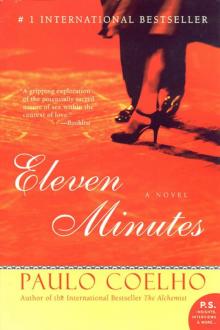 Eleven Minutes
Eleven Minutes Manuscript Found in Accra
Manuscript Found in Accra Warrior of the Light
Warrior of the Light Veronika Decides to Die: A Novel of Redemption
Veronika Decides to Die: A Novel of Redemption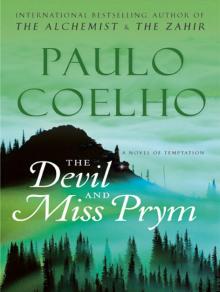 The Devil and Miss Prym: A Novel of Temptation
The Devil and Miss Prym: A Novel of Temptation The Valkyries: An Encounter With Angels
The Valkyries: An Encounter With Angels Brida: A Novel
Brida: A Novel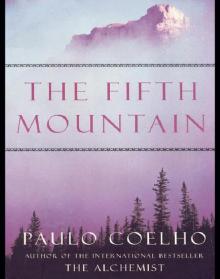 Fifth Mountain: A Novel
Fifth Mountain: A Novel Adultery
Adultery Inspirations
Inspirations The Archer
The Archer The Witch of Portobello
The Witch of Portobello The Pilgrimage
The Pilgrimage The Zahir
The Zahir Brida
Brida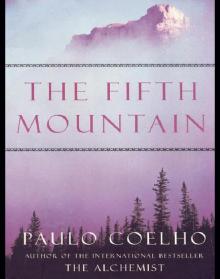 The Fifth Mountain
The Fifth Mountain Like the Flowing River: Thoughts and Reflections
Like the Flowing River: Thoughts and Reflections Manual of the Warrior of Light
Manual of the Warrior of Light By The River Piedra I Sat Down & Wept
By The River Piedra I Sat Down & Wept The Supreme Gift
The Supreme Gift Aleph
Aleph Hippie
Hippie Witch of Portobello
Witch of Portobello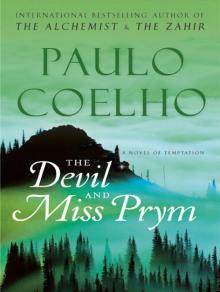 The Devil and Miss Prym
The Devil and Miss Prym The Alchemist - 10th Anniversary Edition
The Alchemist - 10th Anniversary Edition The Valkyries
The Valkyries